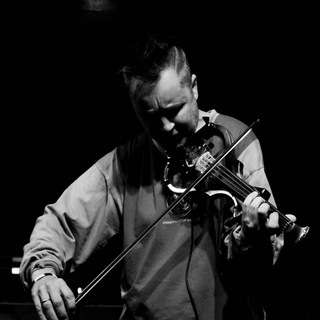|
Back
Bach, Ellington and Kennedy London
Royal Festival Hall
05/29/2010 -
Johann Sebastian Bach: Violin Concerto in E major (I, II) – Two-part inventions (cello* & violin), Concerto in D minor for oboe** and violin (III) – Concerto in D minor for two violins*** (III)
Nigel Kennedy: Hills of Saturn K – Cotton Tail – Crescendo
Duke Ellington: Prelude to a Kiss – In a Mellow Tone – Dusk** – In a Jam – Come Sunday – Diminuendo – Shhhhhh
Nigel Kennedy Quintet, Doug Boyle (guitar), Orphy Robinson (marimba/vibraphone), Beata Urbanek-Kalinowska (cello) (*), Mariusz Pedzialek (oboe) (**), Sonja Schebeck (***) (violin)
The Orchestra of Life, Nigel Kennedy (violin/producer/composer),

N. Kennedy
‘I thought, "why don't I just start my own orchestra?", then I'm not going to have these hypothetical discussions about what is possible and what isn't – just do it!’, wrote Nigel Kennedy in the programme notes for this, the largest-scaled concert of the Southbank Centre's Polish Weekend. Juxtaposing compositions by J. S. Bach (1685-1750) and Duke Ellington (1899-1974) two masters of harmony, melody, and – importantly – improvisation, and performing them with a group of performers from classical, jazz, and other musical backgrounds, it certainly promised to be an interesting evening.
The details of the program not being available in advance, it was something of a disappointment to realise that we were not to hear whole Bach pieces, but to be served up mostly single-movement snippets, Classic FM-style. After a lengthy introduction to the band, the Bach half began with the first and second movements of the Violin Concerto in E. Shortly after the start of the piece, an unexpected rattling sound could be heard, which I first assumed to be some kind of technical malfunction before realising that the drummer had decided to join in too. On further observation, it became clear that the Quintet were to provide an extra continuo group to supplement Bach's orchestration; while the addition of pizzicato bass was pleasantly effective, the tappings and scratchings of the drum kit were just irritating. After the first two movements, Kennedy peered at his set list, enquiring aloud what he was to play next, and a heckler called out "What about the third movement?", which was met with the response "Nah, I don't like it". Instead, we heard four of Bach's two-part inventions, played as duets with principal cello Urbanek-Kalinowska, who was particularly impressive in a high-velocity Invention No.8.
The musical highlights of the evening, for me, were by some distance the two D minor concerti. That distinctive Kennedy sound that I've loved for two decades rang out thrillingly, and his deep love and understanding of Bach's music came out clearly in every phrase. How deep the frustration, then, to get only one movement from each. This seemed particularly unfair when they were followed by the low-light of the concert, a piece of Kennedy’s own. Hills of Saturn K began promisingly as a quiet, thoughtful passacaglia-like trio for electric violin, amplified bass clarinet and double bass, but unfortunately then took a turn towards the prog rock of the 1970s, and in keeping with the sprawling lead guitar solos which plagued music of that period, was technically virtuosic but extremely self-indulgent and, despite the brief interest of a Dolphy-esque bass clarinet cadenza, went on for far too long.
If the first half of the concert jazzed-up Bach, the second half classicised Ellington, featuring a selection of his songs arranged for violin, jazz quintet and orchestra. Syntheses of musical genres can be tricky to do convincingly, and when played too stiffly (or for that matter, too loosely) are usually dire. Fortunately, Kennedy knows his jazz: the arrangements were deft and the musicians well-chosen for the material, the string sections producing a thick creamy sound in Prelude to a Kiss and seamlessly switching between simple and compound measures in In a Mellow Tone. Oboist Pedzialek was given a second chance to shine with some beautifully fluid playing in Dusk, and Boyle, Robinson, and members of the Quintet were also each given their moment in the spotlight.
If one of the aims of this concert was to draw a link between composers separated by over two centuries, this was most clearly achieved in the central section of In a Jam -- a set of variations in wickedly complex three-part counterpoint (violin, soprano sax, and marimba). While intellectually engaging, and in the case of Robinson's marimba playing, quite astonishing, this also outstayed its welcome in terms of length. So, was this genre-blending concert a good idea? Yes, I think so. Was it successful in its aims? Perhaps, but I can't help feeling that Bach was severely short-changed in the process.
Carla Finesilver
|